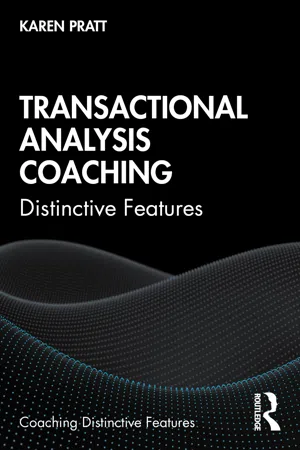
- 154 pages
- English
- ePUB (mobile friendly)
- Available on iOS & Android
About this book
This important book distils the essence of developmental Transactional Analysis (TA) frameworks that are most useful to bring alive professional coaching competencies. Karen Pratt offers clear outlines of TA frameworks as well as describing how they are applied in coaching, with snippets of coaching conversations as illustrations of the theory in practice.
Pratt highlights key TA frameworks in enough detail to be easily grasped but with a focus on application in coaching and other developmental conversations. A TA approach powerfully guides coaches in their listening and questioning. TA is not used as a coaching 'technique' – it offers psychological understanding of human beings and the meaning they make of who they are in the world. Such awareness is key for both professionals and clients in meaningful partnerships for development.
Transactional Analysis Coaching will be key reading for professionals working within present-centered contracts for change – coaches, trainers, facilitators, supervisors, teachers, mentors and managers – seeking to understand how TA can impact their development. It will be of great interest to coaches in training and will provide a useful resource for clients in their ongoing development.
Tools to learn more effectively

Saving Books

Keyword Search

Annotating Text

Listen to it instead
Information
Part 1
TRANSACTIONAL ANALYSIS KEY CONCEPTS
1
Contracting
1.1Introduction
1.2Three areas of contracting
1.2.1Area 1 – Administrative
1.2.2Area 2 – Roles and Responsibilities
1.2.3Area 3 – Psychological clarity
Table of contents
- Cover
- Endorsement Page
- Half Title
- Series Page
- Title Page
- Copyright Page
- Table of Contents
- Figures and Tables
- Introduction
- Part 1: Transactional Analysis key concepts
- Part 2: Transactional Analysis approaches
- Part 3: Application of Transactional Analysis in coaching
- Index
Frequently asked questions
- Essential is ideal for learners and professionals who enjoy exploring a wide range of subjects. Access the Essential Library with 800,000+ trusted titles and best-sellers across business, personal growth, and the humanities. Includes unlimited reading time and Standard Read Aloud voice.
- Complete: Perfect for advanced learners and researchers needing full, unrestricted access. Unlock 1.4M+ books across hundreds of subjects, including academic and specialized titles. The Complete Plan also includes advanced features like Premium Read Aloud and Research Assistant.
Please note we cannot support devices running on iOS 13 and Android 7 or earlier. Learn more about using the app